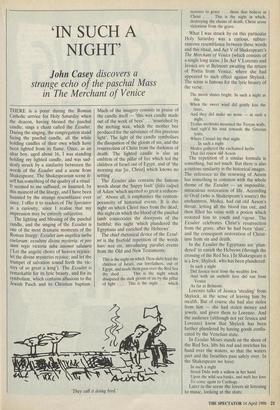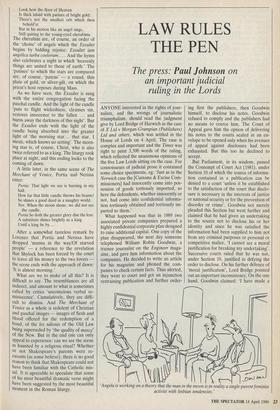`IN SUCH A NIGHT'
John Casey discovers a
strange echo of the paschal Mass in The Merchant of Venice
THERE is a point during the Roman Catholic service for Holy Saturday when the deacon, having blessed the paschal candle, sings a chant called the Exsultet. During the singing, the congregation stand facing the paschal candle, all the while holding candles of their own which have been lighted from its flame. Once, as an altar boy, aged about 16, I was standing holding my lighted candle, and was sud- denly struck by a similarity betweeen the words of the Exsultet and a scene from Shakespeare. The Shakespearian scene it- self has something of the quality of a ritual. It seemed to me suffused, or haunted, by this moment of the liturgy, and I have been haunted by the strange resemblance ever since. I offer it to readers of The Spectator as a curiosity, since I realise that my Impression may be entirely subjective.
The lighting and blessing of the paschal candle, and the singing of the Exsultet is one of the most dramatic moments of the Roman liturgy: Exsultet iam angelica turba coelorum: exsultent divina mysteria: et pro tanti regis victoria tuba insonet salutaris ('Let the angelic choirs of heaven rejoice; let the divine mysteries rejoice; and let the trumpet of salvation sound forth the vic- tory of so great a king'). The Exsultet is remarkable for its lyric beauty, and for its symbolism, which contains allusions to the Jewish Pasch and to Christian baptism.
Much of the imagery consists in praise of the candle itself — 'this wax candle made out of the work of bees' ... 'nourished by the melting wax, which the mother bee produced for the substance of this precious light'. The light of the candle symbolises the dissipation of the gloom of sin, and the resurrection of Christ from the darkness of death. The lighted candle is also an emblem of the pillar of fire which led the children of Israel out of Egypt, and of 'the morning star [ie, Christ] which knows no setting'.
The Exsultet also contains the famous words about the 'happy fault' (felix culpa) of Adam 'which merited so great a redeem- er'. Above all, it emphasises the contem- poraneity of historical events. It is this night on which Christ rises from the dead; this night on which the blood of the paschal lamb consecrates the doorposts of the faithful; this night 'which plundered the Egyptians and enriched the Hebrews'. The chief rhetorical device of the Exsul- tet is the fivefold repetition of the words haec nox est, introducing parallel events from the Old and New Testaments:
This is the night on which Thou didst lead the children of Israel, our forefathers, out of Egypt, and made them pass over the Red Sea dry shod . . . . This is the night which dissipated the dark gloom of sin by the pillar of light . . . . This is the night . . . which
'They call it doing bird.'
restores to grace . . . those that believe in Christ . . . . This is the night in which, destroying the chains of death, Christ arose victorious from the grave.
What I was struck by on this particular Holy Saturday was a curious, subter- raneous resemblance between these words and this ritual, and Act V of Shakespeare's The Merchant of Venice (which consists of a single long scene.) In Act V Lorenzo and Jessica are at Belmont awaiting the return of Portia from Venice, where she had appeared to such effect against Shylock. The scene is famous for the lyric beauty of the verse:
The moon shines bright. In such a night as this When the sweet wind did gently kiss the trees, And they did make no noise — in such a night, Troilus methinks mounted the Troyan walls, And sigh'd his soul towards the Grecian tents, Where Cressid lay that night.
. . In such a night Medea gathered the enchanted herbs That did renew old Aeson .
The repetition of a similar formula is something, but not much. But there is also a curious similarity in the historical images. .The reference to the renewing of Aeson has something in common with the whole theme of the Exsultet — an impossible, miraculous restoration of life. According to Ovid (who is Shakespeare's source) the enchantress, Medea, had cut old Aeson's throat, letting all the blood run out, and then filled his veins with a potion which restored him to youth and vigour. The Exsultet celebrates Christ's resurrection from the grave, after he had been 'slain', and the consequent restoration of Christ- ians from sin and death.
In the Exsultet the Egyptians are 'plun- dered' to enrich the Hebrews (through the crossing of the Red Sea.) In Shakespeare it is a Jew, Shylock, who has been plundered: In such a night
Did Jessica steal from the wealthy Jew, And with an unthrift love did run from Venice As far as Belmont.
Lorenzo talks of Jessica 'stealing' from Shylock, in the sense of leaving him by stealth. But of course she had also stolen from him — she had stolen money and jewels, and given them to Lorenzo. And the audience (although not yet Jessica and Lorenzo) know that Shylock has been further plundered by having goods confis- cated by the Venetian state.
In Exodus Moses stands on the shore of the Red Sea, lifts his rod and stretches his hand over the waters, so that the waters part and the Israelites pass safely over. In the Shakespeare we have:
In such a night Stood Dido with a willow in her hand Upon the wild sea-banks, and waft her love To come again to Carthage.
Later in the scene the lovers sit listening to music, looking at the stars:
Look how the floor of Heaven Is thick inlaid with patines of bright gold: There's not the smallest orb which thou behold'st But in his motion like an angel sings, Still quiring to the young-eyed cherubims. The cherubim are, of course, an order of the 'choire' of angels which the Exsultet begins by bidding rejoice: Exsultet iam angelica turba coelorum. . . . And the hymn also celebrates a night in which 'heavenly things are united to those of earth.' The 'patines' to which the stars are compared are, of course, 'patens' — a round, thin plate of gold, or silver-gilt, on which the priest's host reposes during Mass.
As we have seen, the Exsultet is sung with the entire congregation facing the paschal candle. And the light of the candle `puts to flight wickedness, cleanses sin, restores innocence to the fallen ... and burns away the darkness of this night'. But the Exsultet ends with the light of the candle being absorbed into the greater light of 'the morning star... that star, I mean, which knows no setting'. The morn- ing star is, of course, Christ, who is also twice referred to as a king. The liturgy took place at night, and this ending looks to the coming of dawn.
A little later, in the same scene of The Merchant of Venice, Portia and Nerissa enter: Portia: That light we see is burning in my hall.
How far that little candle throws his beams! So shines a good deed in a naughty world. Ner. When the moon shone, we did not see
the candle.
Portia So doth the greater glory dim the less: A substitute shines brightly as a king
Until a king be by...
After a somewhat tasteless remark by Lorenzo that Portia and Nerissa have dropped 'manna in the way/Of starved people' — a reference to the revelation that Shylock has been forced by the court to leave all his money to the two lovers the scene ends with the approach of dawn: 'It is almost morning.'
What are we to make of all this? It is difficult to say. The resemblances are all Indirect, and amount to what is sometimes called by critics 'unconscious verbal re- miniscence'. Cumulatively, they are diffi- cult to dismiss. And The Merchant of Venice as a whole is redolent of Christian and paschal images — images of flesh and blood offered for the redemption of a bond, of the lex talionis of the Old Law being superseded by 'the quality of mercy' of the New. But in the end one can only appeal to experience: can we see the scene as haunted by a religious ritual? Whether or not Shakespeare's parents were re- cusants (as some believe), there is no good reason to think that Shakespeare could not have been familiar with the Catholic mis- sal. It is agreeable to speculate that some of his most beautiful dramatic verse might have been suggested by the most beautiful moment in the Roman liturgy.



















































 Previous page
Previous page